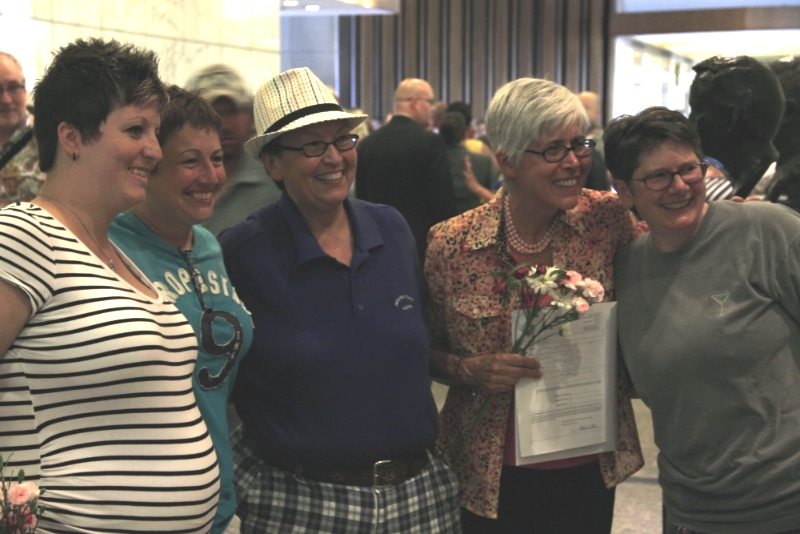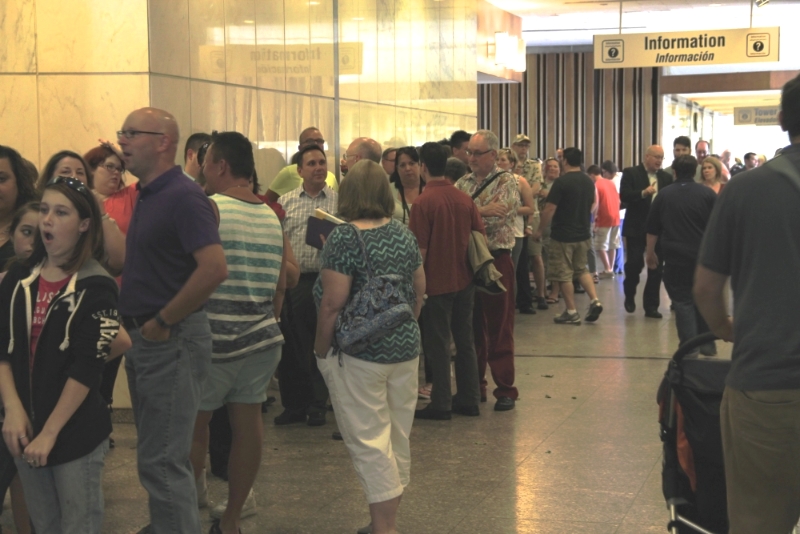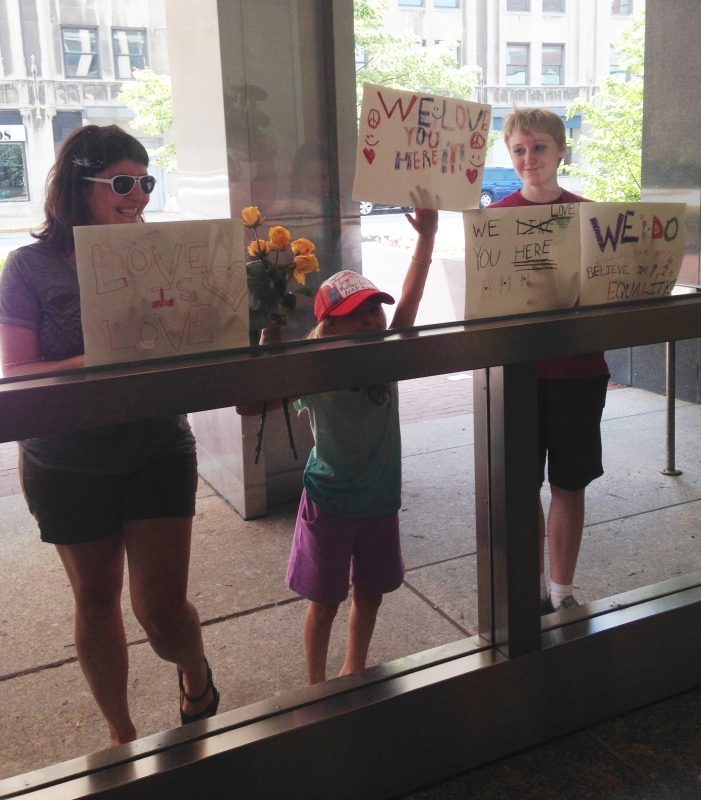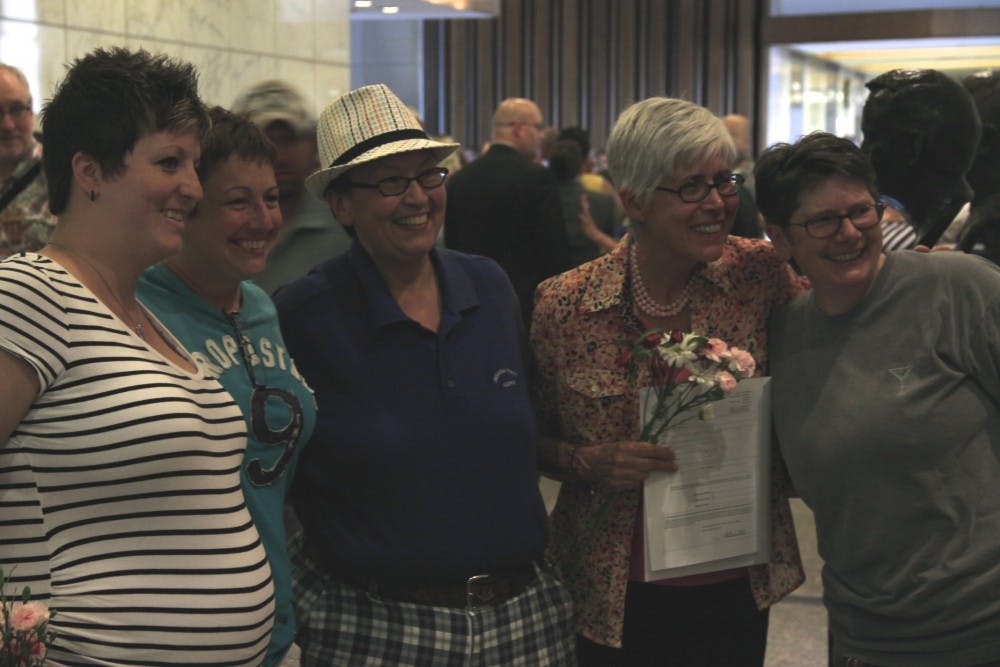UPDATE: After receiving word from the state Thursday morning, Delaware County is issuing marriage licenses to same-sex couples.

|
| A same-sex couple poses for photos after receiving legal recognition of their marriage June 25 at the Marion County Clerk’s Office in the Indianapolis City-County Building. A federal judge ruled the state’s same-sex marriage as unconstitutional earlier that day. DN PHOTO KATELYN JAMISON |
Same-sex couples lined up to marry in Indiana, following a decision by a federal district court judge Wednesday.
The ruling took effect Wednesday afternoon and allows same-sex couples to receive marriage licenses in the state. It also immediately recognizes marriages granted in other states.
The decision comes a few months after the state’s Senate voted through House Joint Resolution 3, a proposed amendment to the Indiana Constitution that defines marriage between a man and a woman. Since HJR-3 was passed with different wording, it needs to pass through the House and the Senate once more before potentially going to a public vote in 2016.
U.S. District Court Judge Richard Young ruled that the state’s ban denies same-sex couples their Fourteenth Amendment right to equal protection under the law.
“In less than a year, every federal district court to consider the issue has reached the same conclusion in thoughtful and thorough opinions — laws prohibiting the celebration and recognition of same-sex marriages are unconstitutional,” Young wrote in his decision.
When the announcement was made, some county clerk offices, which issues marriage licenses, were unsure what they were allowed to do.
A representative for the Delaware County Clerk’s Office said the office did not issue any licenses to same-sex couples Wednesday because they were told to wait for official word from the attorney general’s office.
The representative said they received “quite a few” calls and inquiries from couples and expects a lot of business once the office starts issuing licenses to same-sex couples.
As Delaware County waited for the word, the Marion County Clerk’s Office began issuing licenses within an hour of the ruling.
According to The Associated Press, Marion County Clerk Beth White offered short civil ceremonies for couples if they gave a $50 donation to the Indiana Youth Group, a nonprofit benefitting lesbian, gay, bisexual, transgender and queer teens. White posted on her Facebook that they raised nearly $4,000.
White’s office also is changing the wording of the online marriage license application from “bride and groom” to “spouse and spouse.”

|
| A line of same-sex couples forms June 25 inside the Marion County Clerk’s Office in the Indianapolis City-County Building. Many same-sex couples received their marriage licenses as the office stayed open until 8 p.m. DN PHOTO KATELYN JAMISON |
AT BALL STATE
Marty Wood, an associate professor of physiology and health science, has been with his partner, Sam Crimmins, for six years and said the announcement has left him feeling excited.
“Elated, I guess, is one word to describe it,” he said. “I am overwhelmed by an avalanche of emails and congratulatory posts on social media. ... It is just a celebratory feeling.”
He said Indiana’s decision puts the United States on track to join other “civilized countries” in allowing same-sex marriage equality. These countries are Argentina, Belgium, Brazil, Canada, Denmark, England, Wales, France, Iceland, Luxembourg, the Netherlands, New Zealand, Norway, Portugal, Scotland, South Africa, Spain, Sweden and Uruguay, according to Pew Research.
|
Countries that allow gay marriage Argentina, Belgium, Brazil, Canada, Denmark, England, Wales, France, Iceland, Luxembourg, the Netherlands, New Zealand, Norway, Portugal, Scotland, South Africa, Spain, Sweden and Uruguay Countries where gay marriage is partially legal Mexico and the United States SOURCE: Pew Research |
The feelings Wood has are less about him — although Crimmins and Wood have talked about it, they aren’t quite ready to make the life-changing decision — and more about striking a win for civil rights.
Brian Robbins, vice president of Spectrum, a LGBTQ campus group, and said late Wednesday night that the realization of what the decision means was still settling in.
“I am shocked because it is Indiana,” he said. “It is a big step ... [because] Indiana is not a liberal state.”
He said Indiana’s notoriety as a conservative state may help push other LGBTQ organizations in other conservative states to fight for marriage equality.
Wednesday’s decision gave same-sex couples the same meaning shared by opposite-sex couples.
“That is kind of one of the things that, as a gay male, that is on my mind,” he said. “It lets me propose to someone and now, it is something that can actually mean something.”
Some students disagreed with the ruling, though. Becca Kropf, a junior dietetics major, said her Christian faith meant she doesn’t accept same-sex marriage.
“But that doesn’t mean you should degrade people for their choices,” she said, alluding to some people who actively hate LGBTQ people.
She said at the end of the day, there are several things she and many Christians don’t agree with that she just has to deal with legally, for now.
Hassan Lahi, a student working toward a master’s degree in physics, is Muslim and said even though same-sex marriage is counter to his religious beliefs, he thinks people should be free to do what they want.
“For me, I don’t care; it is their choice,” he said. “In [my home country of Saudi Arabia], it is banned, but people should have the right to chose what they want.”

|
| Children hold up signs June 25 outside the Marion County Clerk’s Office. Their signs read, “We love you here.” DN PHOTO BRIEE EIKENBERRY |
LAWMAKERS’ OPINIONS
The Indiana attorney general’s office filed a request for an emergency stay in U.S. District Court on Wednesday. A stay of the ruling would stop same-sex couples from marrying until the appeals process is finalized.
|
Stay The attorney general’s office filed an emergency motion for a stay Wednesday. A stay is the act of temporarily stopping a proceeding. If stay Indiana will not be able to issue legal marriage licenses until the appeal process is finished. Marriage licenses issued before the stay will be considered legal. If no stay If there is no stay issued, offices will continue to issue marriage licenses, and same-sex marriages performed outside of Indiana can still be recognized in the state. Compiled by Evie Lichtenwalter |
He said the motion for a stay is to “prevent confusion and inconsistency between county clerk’s offices.”
However, Young wrote into his decision that a request for a stay of ruling is moot, implying that his ruling will stand.
The office, along with Boone and Hamilton clerks, also filed a notice of appeal for the 7th Circuit Court of Appeals in Chicago.
Gov. Mike Pence supports the office’s appeal of the ruling, said Kara Brooks, Pence’s press secretary, in a statement.
“... [He] defends Indiana’s right to define the institution of marriage for the residents of our state,” she said in the statement.
Indiana’s State President Pro Tempore David Long said in a statement that the Supreme Court needs to rule on the same-sex marriage issue instead of leaving lower federal courts to overturn state laws.
“The current chaos over state marriage laws that is being created by these lower federal court rulings needs to stop,” he said in the statement. “And only the Supreme Court can make that happen.”
Not every Indiana lawmaker opposes Wednesday’s announcement. State Sen. Tim Lanane of District 25 “hailed” the decision.
“This is a win for equality, the community and those who have taken a stand over the years to protect the rights of all Hoosiers,” he said in a statement.
AROUND THE COUNTRY
Indiana wasn’t the only state affected by a ruling on same-sex marriage Wednesday.
A federal appeals court ruled for the first time that states have to allow same-sex couples to marry in a case covering Colorado, Kansas, New Mexico, Oklahoma, Utah and Wyoming.
However, the 10th U.S. Circuit Court of Appeals panel issued a stay on its ruling pending an appeal. This panel can chose to either hear the case or pass it along to the Supreme Court.
If the Supreme Court makes a ruling on the case, it would become federal law and all states must follow the decision.

|





